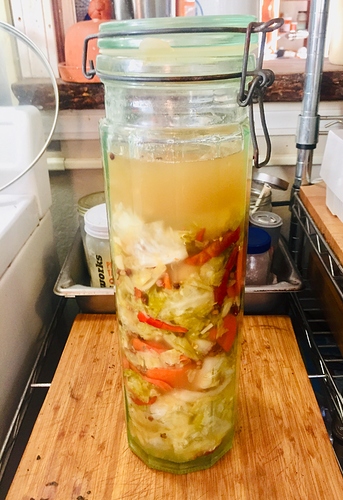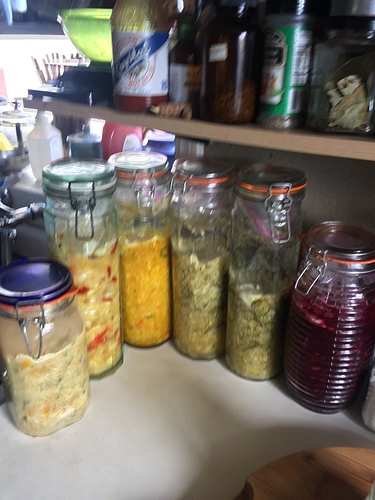I’m excited to be starting a fermented vegetables journey, I’ve missed eating vegetables to my heart’s content.
I’ve read generally that carbohydrate content goes down with fermenting, but is there a source for macro information on fermented vegetables?
Plenty of recipes and how to out there, but usually missing the macro information.
Fermented Vegetables & Carbs
Hi Oyansa, Fermentation is something I really enjoy doing. I make sauerkraut, kimchi and paò caí. I just started a batch of Paò Caí last Friday. There’s a thread I made in recipes:
Here’s a collection of batches I made in the spring:
About the carbs in ferments, much of the sugars in the vegetables are digested during lactic fermentation. As an example one cup of cooked shredded cabbage is 5.4g carbohydrate and the same amount of sauerkraut is 1.2g. carbohydrate. So nearly an 80% reduction. Here’s the thing, I just used the generic macros for sauerkraut for everything I fermented. First tracking is almost always a guessing game no matter what the item is (there’s exceptions). It’s not nearly the exact science many believe it is. Natural variations in sugar content are obvious to people with normal taste capacity, Wow, these tomatoes you grew are super sweet!
You could pretty much fill yourself with fermented vegetables at every meal and stay under your carb allowance. Enjoy 

Do you have a source for this, David? If fermentation is generally valid, what’s the problem with beer?
I just answered my own question about beer. I suspect it applies to other fermented carbohydrates as well. Here’s the source.
For beer specifically, the enzymes and yeast that produce the end product, ethanol, only convert simple sugars (maltose and glucose) to ethanol. More complex sugar (carbohydrate) molecules are left behind to remain in the beer. Thus, the first step in beer making is converting the complex carbs of the grain to simple carbs that can be fermented. This is a multi-step process that more or less successfully converts all the carbs depending how precisely temperature and time are controlled. Generally, a lot of carbs get left behind in the finished beer.
I suspect, that the degree of carb conversion in other fermented foods is likely similar.
The source is Cronometer.
It’s not fully fermented would be my guess. Also sour mash has carbs before distilling into whiskey. All wines but the driest champagnes have some carb content too. And fermenting vegetables doesn’t get rid of all carbs, just maybe 70-80%. 
The longer fermentation is allowed to continue with sauerkraut the microbes continue to feed on the sugars. They slow down as the supply dwindles. The kraut gets very sour and the texture goes mushy. You decide if you like it crisp or more fermented. I usually harvest kraut at 3 weeks or a month. Past that I don’t find improvement. 
Years ago when I lived at Lake Laberge in the Yukon we made sauerkraut every fall in a 10 gallon bucket. I don’t remember now how long we left it until we started to eat it, probably a month or two. I don’t recall it ever going bad even though it lasted us through the winter and spring.
Regarding ethanol. I’ve brewed beer pretty much my entire adult life and done a small amount of distilling. I’m curious enough to experiment towards developing a truly low/no carb beer (or whatever) that has flavour. Unfortunately, the challenge is that the stuff that gives beer its flavour is non-fermented carbs. So something has to replace that. Maybe aging in charred barrels like bourbon. 
@amwassil Carl Franklin posted a recipe for hop infused scotch that he mixed with club soda. Did you ever check that out?
Everything I’ve read about fermented sauerkraut, it is an amazing super food and has many anti-cancer properties (glucosinolates); esp. for breast cancer.
Iodination of tyrosine is important because it increases the thyroid hormone thyroxine and allows tyrosine to produce catecholamines which are the actual mechanism of lipolysis that release fat from adipose cells by activating inactive lipase within the fat cell and then it is released as an FFA
to be oxidized into ketones…dam that’s fascinating? (the biological infrastructure of mechanical, chemical and electrical matrixes and how they interact in the human body)
Why iodine balance is so important for burning body fat or shrinking adipose tissue and apoptosis of cancer cells?
References:
[1] Thiocyanates - inhibit iodine uptake by the thyroid leading to reduced iodination of tyrosine --resulting in decreased production of the important thyroid hormone thyroxine. …More
No. I did find another recipe online for what’s probably the identical thing. Something like that, ie using hard liquor watered down to 5-10% or so, is an option. But the carbonation would not be similar to carbonation in beer. The ability of beer to hold a head is primarily due to protein from the malt used to make the beer (less so from presence of hops). So there has to be some protein in the mix.
Then there’s this:
That was the main criticism of it, but some said it tasted a bit IPA like. I think most of the low carb beers just cut back severely on barley.

@Oyansa Sorry your thread got hijacked!  Now back to our regularly scheduled program…
Now back to our regularly scheduled program…
No problem, David. Actually perhaps you can answer another question I have. I’ve just switched from tequila as my sunset salutation to Makers Mark Bourbon. I notice it has what I would characterise as a “cherry” undertone. You mention the barrels are charred…are cherry wood barrels used by any chance?
And thank you for the suggestion of using sauerkraut macros to track carbs, that’s helpful. I’m so excited to be starting this fermentation journey, and eating lots of beautiful veggies again!
Search for “fermented” turns up 21 pages.
@amwassil Wow, it’s tough to navigate though. Fermented salmon? I tried adding vegetables to fermented and it went from like 1002 entries to 42,000 something. I’ll just take the 1.2g carbs and eat dinner…


That was Michael but to answer the question, No. They use charred oak barrels for Bourbon. I always thought Maker’s Mark had maple syrup undertones. I used to live in Kentucky, worked in a bar and drank quite a lot of Bourbon back then. I rarely drink now as I don’t think regular alcohol use and ketosis play well together. I save it for special occasions now. 


